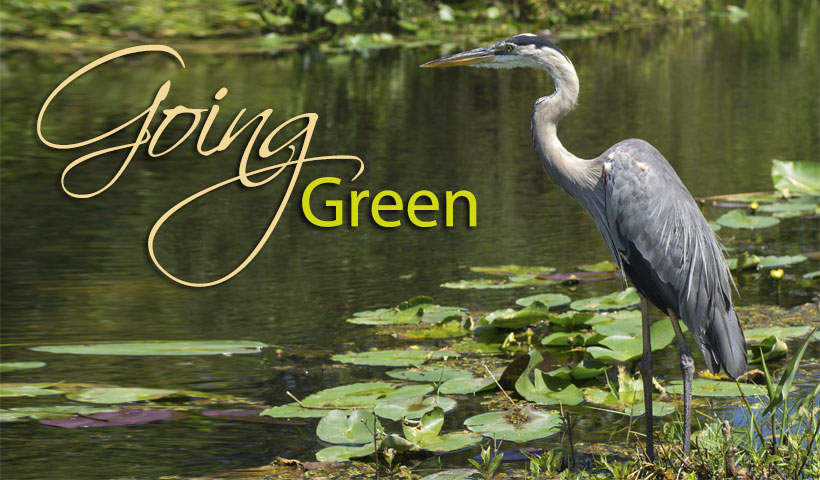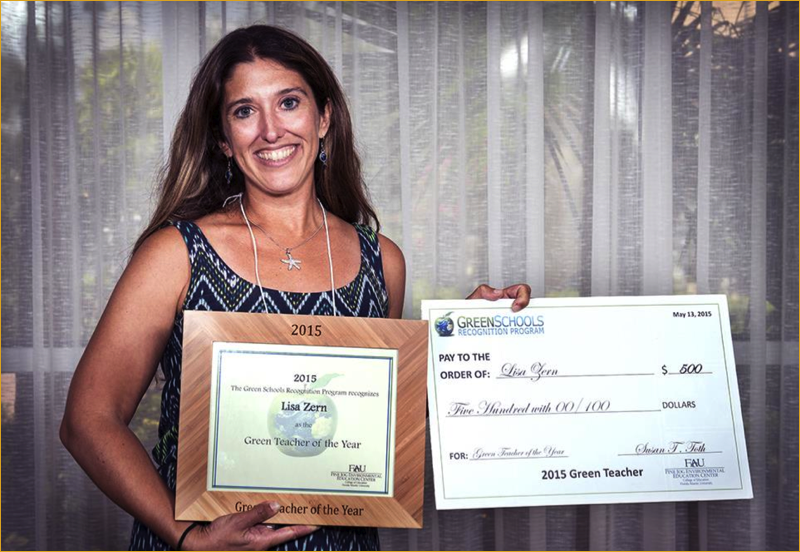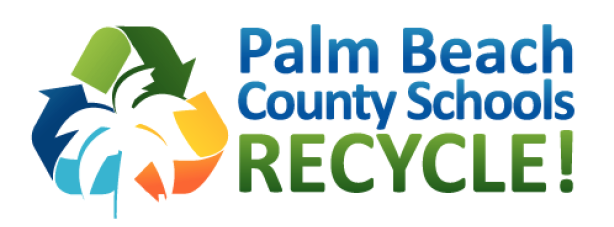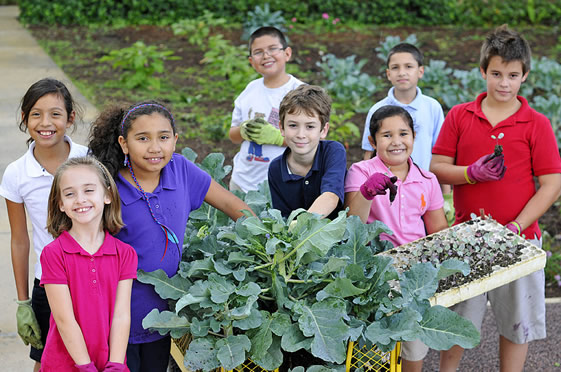

The School District takes a command role in being a good steward of the natural and built environment and is committed to the precept that conservation and resource efficiency are everyone’s responsibility. One vehicle for executing the District’s activist environmental policy is its Green Schools Initiative, involving all members of the county’s 186 schools, administration, and school communities; the initiative is led by the Division of Support Operations. The three main pillars of the Green Schools Initiative are Building Green, Learning Green, and Living Green.
The Green Schools Initiative provides a platform for activities, programs, and partnerships that support environmental stewardship at all District levels including academic and non-instructional. The District’s commitment to green principles also illustrates the important relationship between personal wellness, health, and sustainability of our one and only planet.
In 2015, the District’s esteemed Learn Green Conference was the proud recipient a national Green Schools Network - Green Difference Award in the Outstanding Green Program category.
The School District of Palm Beach County is a national leader in the construction and maintenance of green schools. In May 2009, as part of a policy to encourage energy and water conservation, the District added a provision stating: “The District shall plan, design, construct, operate and maintain all new District buildings to meet the Leadership in Energy and Environmental Design (LEED) Silver certification level.” Furthermore, “The District will endeavor to make all existing District buildings LEED certified based on available resources.”
As of 2015, the School District has achieved LEED certification for ten schools through the USGBC and one school by the Florida Green Building Coalition. Of the ten schools, one received LEED Platinum certification (the highest certification level possible), five schools achieved LEED Gold, two LEED Silver, and two are USGBC Certified. Three other elementary school projects are anticipated to achieve LEED ratings this year, as well. In the first project of its kind, the District was awarded LEED for Existing Buildings, Operations & Maintenance for Heritage Elementary School in early 2014.
Benefits of building and maintaining green schools include significant energy savings, measurable reductions in waste generation, decreased water use, and improved indoor air quality. Other benefits are less tangible and harder to demonstrate empirically, but are no less desirable. These include improvements in occupants’ health and sense of wellbeing, increased employee morale, productivity, recruitment, employee retention, and improved student achievement.
Benefits of building and maintaining green schools include significant energy savings, measurable reductions in waste generation, decreased water use, and improved indoor air quality. Other benefits are less tangible and harder to demonstrate empirically, but are no less desirable. These include improvements in occupants’ health and sense of wellbeing, increased employee morale, productivity, recruitment, employee retention, and improved student achievement.
Another important component of the Green Schools Initiative is to provide support for all schools in their efforts to bring sustainability concepts to the campus and the classroom. In the majority of the District’s schools, students participate in green education, either through traditional classroom curriculum or “experiential” learning outside the classroom. Some of the topics covered include energy and water efficiency, waste reduction and recycling, as well as lessons about the importance of good indoor environmental quality and healthy outdoor environments.
Another initiative used to support sustainability is the Green Schools Recognition Program (GSRP) partnership with Florida Atlantic University (FAU) that celebrated its seventh successful year in Palm Beach County during 2015. The program recognizes and rewards schools for taking an innovative and holistic approach to going green that includes school ground enhancement, resource conservation, curriculum connections, and community involvement with a demonstrated school wide commitment and focus on sustainability.
The GSRP is coordinated by FAU’s Pine Jog Environmental Education Center in collaboration with the District’s Environmental & Conservation Services department and was launched in 2008 with support from the Community Foundation for Palm Beach and Martin Counties.
On May 13, 2015, seventy-nine (79) public and private schools in Palm Beach and Martin Counties that have made the grade in “going green” during this school year celebrated their efforts at the seventh annual Green Schools Awards Luncheon held in their honor at the West Palm Beach Marriott.
The Green Schools Recognition Program (GSRP) recognizes school centers for taking a holistic and innovative approach to going green that incorporates grounds enhancement, resource conservation, curriculum connections, and community involvement with a school-wide commitment and focus on sustainability.
In addition to the School District, Community Foundation and FAU, GSRP is supported by a host of community partners including the Solid Waste Authority of Palm Beach County; Florida Power & Light; Florida Department of Transportation’s SchoolPool, Audubon Society of the Everglades, City of West Palm Beach Office of Sustainability, Florida Federation of Garden Clubs District Ten, UnitedHealthcare, and the Jacobs' Wellington Charitable Fund.
Recognition was given to 16 “Green Schools of Promise,” 23 “Green Schools of Quality” and 40 “Green Schools of Excellence.” These levels illustrate that ‘going green’ is a journey, and that schools should be acknowledged for their efforts along the way.
- default_title1st Place - Grassy Waters Elementary School received a cash award of $2,000.
- default_title2nd Place - Everglades Elementary School received a cash award of $1,000.
- default_title3rd Place Tie - Timber Trace Elementary School received a cash award of $750.
- Show More
- default_titleAudubon Society of the Everglades: Habitat Improvement $500: Palm Beach Central High
- default_titleCity of West Palm Beach: Green your WPB School $500: South Olive Elementary
- default_titleFlorida Federation of Garden Clubs (District X): Schoolyard Enhancements: Dr. David L. Anderson Middle School
- default_titleFlorida Power and Light: Energy Conservation $ 500: Cardinal Newman High
- default_titleGrowums: Green Fundraising $500: Good Shepherd Episcopal School
- default_titleJacobs’ Wellington Charitable Fund $500 each to: Equestrian Trails Elementary School, Elbridge Gale Elementary School, and Palm Beach Central High School
- default_titleMemory Trees: Environmental Innovation $500: A.D. Henderson University School and Environmental Innovation $250 each to: Felix A. Williams Elementary and Boynton Beach Community High School
- default_titleSouth Florida Commuter Services School Pool: Transportation $500: Sandpiper Shores Elementary School
- default_titleSolid Waste Authority of PBC: Solid Waste Reduction and Conservation $500: Timber Trace Elementary School
- default_titleAnonymous Donor: Most Improved Green School $500: American Heritage School
- default_titleUnited Healthcare: Health and Wellbeing $500: Golden Grove Elementary
- default_titlePine Jog Environmental Education Center of Florida Atlantic University: $250 for each
o Community Partnerships – JD Parker Elementary School
o Student Led Initiatives – Warfield Elementary School
o Best Use of Benchmarking – Palm Beach DayAcademy - Show More
In total, $11,750 was awarded to schools that serve as models to others for implementing green school programs and practices. All cash awards are intended to help these schools continue to grow their “green” projects.
For the first time, a Green Principal of the Year was named. Kathy Pasquariello, Principal of Timber Trace Elementary School, was nominated by her school and was awarded $500. In addition, for the second year in a row, the program recognized a Green Teacher of the Year, which this year is Lisa Zern from Jupiter Middle School. She, too, received $500 for her exemplary green strides.

Lisa Zern from Jupiter Middle School was named the 2015 Green Teacher of the Year.
Ms. Zern was one of the earliest and most enthusiastic supporters of the green schools program.
On October 20, 2014, the sixth annual LEARN GREEN conference was held on the campus of Alexander W. Dreyfoos School of the Arts in West Palm Beach. The conference included a one-day forum of workshops and exhibits that provide opportunities for school staff, parents, administrators, and students to learn how to “go green” at school and at home. Approximately 60 exhibitors and over 900 participants from the local community and representing public and private schools throughout the state of Florida attended this year’s conference. The strong underlying message of the conference was, “You don’t need to have a green school building to build a green school!”

The nearly 900 attendees and 60 exhibitors filled the gymnasium of Dreyfoos
School of the Arts during the 2014 Learn Green Conference. Here, attendees
flood the bustling exhibit hall during one of the breaks between the breakout
Living Green sessions.
A final component of the Green Schools Initiative is the application and integration of sustainability concepts into the District’s daily operations. Specifically, the District works to reduce its consumption of natural resources, reduce waste generation, increase reuse and recycling rates, manage school environments to achieve healthier indoor air quality, and build institutional capacity for sustainability.
The School District currently has a very robust recycling program, which includes paper, cardboard, mixed commingled materials (plastic, glass, aluminum, and drink containers), ink and toner cartridges, electronics (“e-waste”), some food packaging, empty glue sticks, shoes and clothes, rechargeable batteries, and scrap metal.

Some of the Green School Initiative’s measureable outcomes include a reduction of its overall electrical usage and expenses, even as new buildings and square footage have increased. Innovative practices and aggressive policies have resulted in the District achieving an overall reduction of 22.3% in energy usage and savings of over $25M from FY2008 to FY2015. Each year, on average, robust recycling results in the diversion of more than 800 tons of mixed plastic, glass, and aluminum and 5,675 tons of paper products from the landfill, saving over $550,000 in disposal fees.
In an effort to achieve healthier indoor air quality (IAQ) in schools, staff from the Environmental & Conservation Services (ECS) department conduct environmental assessments, investigate sources of indoor-air quality concerns, and review District chemicals for potential hazards.
Individual schools implemented many new sustainable practices and participated in projects that enhanced their environmental wellbeing. Among other projects, schools installed vegetable, butterfly, and hydroponic fruit gardens, instituted innovative recycling programs, created “green” curriculum connections, and engaged the greater school community in their sustainability efforts.

Gardening is a key component of many schools' "green" initiatives.
The District constantly surveys the horizon for new opportunities to improve operations, while maintaining high standards for academic achievement and student engagement. The Division of Support Operation’s LEED-accredited professionals and front-line employees alike have propelled the District into the national spotlight and continue to serve as a model for other organizations interested in environmental stewardship and investing in the future.
District staff work to form strong collaborations within the organization, as well as with community partners, to achieve the many goals of a green schools program and shared the philosophy that you need not have a green school building in order to build a green school! We believe that all schools can achieve great green strides through careful planning, maintenance & operation, thoughtful integration of environmental principles into the core curriculum, and strong belief in the idea that all children deserve healthy schools to give them the best chance of reaching their highest potential.
www.usgbc.org
USGBC South Florida Chapter
www.usgbcsf.org
Florida Green Building Coalition
www.floridagreenbuilding.org
www.ourgreenschools.com
Center for Ecoliteracy
http://www.ecoliteracy.org/
http://www.palmbeachschools.org/eco/Recycling.asp
District’s energy use and conservation webpage
http://www.palmbeachschools.org/eco/Electricity.asp
Solid Waste Authority
www.swa.org
Resource Depot
www.resourcedepot.net
